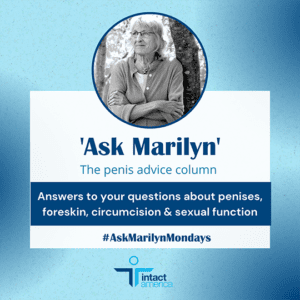 Dear Marilyn:
Dear Marilyn:
My son is 8 years old. His foreskin was red and sometimes it stings when he urinates, so I took him to our pediatrician. The doctor said his foreskin is too tight and recommended a steroid cream, suggesting we use it three times a day and that my son should try to gently pull his foreskin back. Once my son stopped using the cream, his foreskin closed down even tighter than it was before. We only use mild soap in the bath, but he does take swimming lessons once a week. I’m wondering what to do now to help my son.
—Katherine in Canada
Dear Katherine:
Your son’s foreskin is doing its job, which is protecting the glans (the head of the penis) and urethral meatus (urinary opening) from irritants. When the foreskin tightens, the meatus often narrows, so urination can become painful or difficult.
Paradoxically, by recommending a steroid cream and urging your son to try to retract the foreskin, the pediatrician made your son’s condition worse. When steroid creams are used prematurely, it is not unusual for the foreskin to become tighter when the treatment ends. The foreskin probably is also reacting to the attempted retractions.
It appears that your son has developed a yeast infection, which likely caused his foreskin to turn red. Unfortunately, your pediatrician failed to realize that your son’s problem is not a tight foreskin, but rather a yeast infection that is irritating the foreskin.
Fortunately, it is relatively easy to treat a yeast infection with over-the-counter probiotics, such as liquid Acidophilus culture. Apply it on the foreskin six times a day. You or your son can pour a little culture into the palm of his hand and then he can dip the tip of his foreskin into the solution. He can use his fingertips to rub it around the afflicted area. The foreskin usually returns to normal in three to five days. (Note: There’s no need to retract his foreskin for this to work. The foreskin will retract naturally when it is time.)
We can’t tell if the yeast infection was caused by the mild soap you use in the bath or the chlorine in the pool where he swims. Therefore, use only warm water on his genitals and keep him out of pools while he is healing. Once his foreskin returns to health, watch to see if his foreskin reacts to the soap. If it does, don’t worry. You can keep his penis perfectly clean by washing it with warm water only.
Once his foreskin heals, your son can resume his swimming lessons if you take several precautions. He should apply non-petroleum jelly on his foreskin prior to going into chlorinated water. After swimming, he should shower to remove the chlorine from his body and then gently wipe away the protective cream from his foreskin. If he still reacts to the chlorine, limit his time in the water and the frequency of swimming.
Finally, please tell the pediatrician what you’ve learned so that the pediatrician will know better and can begin helping boys rather than causing additional problems.
—Marilyn





